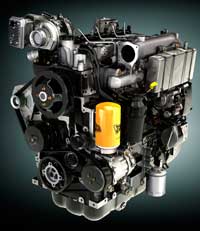JCB’s cleanest engine meets legislation without post-treatments

JCB is the latest manufacturer to announce the engine technology it plans to use to meet Tier 4 interim (Stage B), the next round of emissions legislation.
After investing £80 million, the company has developed the first engine not to require exhaust after-treatment to meet these regulations, it says.
According to the company, the expectation was that to meet the first part of Tier 4 interim (Stage 3b) legislation, a diesel particulate filter (DPF) or exhaust after treatment would be required.
Instead, the JCB Power Systems Ecomax T4 4.4-litre engine, due to go into production in 2012, instead concentrates on not producing the pollutants in the first place by fine tuning the combustion process with the help of engineering specialist Ricardo.
With second-generation common rail fuel injection technology, says JCB, injection pressures have been raised to 2000 bar, nozzle hole geometry has been refined and variable geometry turbochargers have been incorporated to all but the smallest engines. Exhaust gas recirculation (EGR) is used to clean up emissions before they leave the engine itself.
The engine also uses a clever electronic control system that has a learning capacity, meaning that as engine components settle, the engine stays within the intended settings.
JCB claims that, compared to previous generation common rail systems, the new engine boasts 5-10% better fuel efficiency, but the company admits that it may be necessary to use exhaust after-treatment in order to meet NOx reduction targets.
More jobs have been created at JCB’s Power Systems plant in Derbyshire, and the original 4.4-litre Dieselmax 444 engine has now been joined by a 4.8-litre 448 version.

